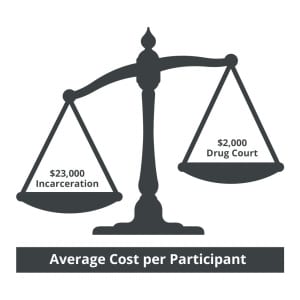
Nationwide, the Illinois Department of Corrections has one of the highest inmate populations in the United States. The Illinois’ prison population, designed for a maximum capacity of 32,000 inmates, is now at an all-time high of close to 50,000.1
Is there a possibility that some counties are stricter than others when it comes to drug-related arrests and conviction? In areas where an arrest results in conviction and time in jail, this only adds to the already overcrowded prison situation. One viable alternative, to help keep the prison population down, is to enroll the defendant in a problem-solving court program.
Top 4 Benefits of Drug Court Programs
- Reduces prison overcrowding
- Lowers rate of recidivism
- Significant savings compared to cost of incarceration
- Program requirements include participation in addiction treatment
Recommendations to Reduce Prison Overcrowding
In December 2016, the Illinois Commission on Criminal Justice and Sentencing Reform released a report with 27 recommended reforms to help reduce overcrowding in the State’s prison system. If all the reforms mentioned in the report were successfully implemented, it’s estimated the prison population would be reduced up to 25 percent by 2025.
One of the top recommendations in the Sentencing Reform report includes increasing capacity and treatment options for behavioral health services in jurisdictions currently lacking drug and mental health courts to help reduce re-offense rates, i.e. recidivism.
Problem-Solving Courts Reduce Recidivism
In the article Drug-Addicted Offenders and Treatment Needs in Illinois Sharyn Adams says, “Last year, 45 percent of the 28,612 Illinois Department of Corrections inmates screened for substance abuse upon prison entry were deemed in need of treatment.”2
Possible solutions to help this underserved population include expanding in-prison treatment programs, offering aftercare services once they get out of prison so they don’t reoffend and using drug courts as an alternative to incarceration.
Drug courts offer defendants an alternative to jail time, namely in the form of probation that includes participation in a supervised addiction treatment program. The drug court professional team consists of the judge, lawyers, probation officer, treatment providers and more. Unfortunately, of the 102 counties in Illinois, only 58 currently have problem-solving court programs in place.3
Finding alternative methods of helping people involved in drug-related offenses is important, no matter where a person resides, but especially so in areas not currently served by drug courts. Tim Ryan, National Outreach Recovery Director for Transformations Treatment Center says, “We also need to focus on having a peer recovery support specialist working with people to get them into recovery and help them grasp and truly understand what living recovery means.”
Illinois Drug Court Treatment Act
The purpose of the Illinois Drug Court Treatment Act is to cut the rate of drug use, help people with a substance use disorder and prevent crimes committed due to drug addiction or drug use. A defendant can only be admitted to a drug court program with the approval of the court.
The top 3 reasons for exclusion from a drug court program include:
- Defendant refuses to take part in a treatment program
- Defendant denies the substance use disorder
- Defendant is convicted of a violent crime
Drug Court programs coordinate available resources including substance abuse professionals, judicial monitoring and local social service agencies to offer eligible defendants addiction treatment service in lieu of incarceration.
Probation as Option to Incarceration 
As a nation, too many people get sent to prison without being offered any chance at reform. Mandatory prison sentences and longer prison sentences have very little effect in deterring future criminal activity. Probation, as part of a drug court program, can ease problems such as:
- Prison overcrowding
- High recidivism rates (tendency for a criminal to re-offend)
- Social and economic costs associated with incarceration
According to the National Association of Drug Court Professionals (NADCP) 75 percent of drug court graduates don’t reoffend, while only 30 percent of prisoners don’t reoffend.4 The average drug court cost per participant is $2,000, compared to an average cost of incarceration of $23,000, that’s a savings of about $21,000 per defendant.5
There are many conditions and requirements that must be met while someone is on probation. Some of the more common drug court requirements include:
- Mandatory drug tests
- Anger management classes
- Mental health assessment
- Community service
- Court ordered addiction treatment
- Regular reporting to probation officer
- Reimbursement of court fees and related costs
- Other requirements such as life skills training or proof of actively looking for a job
The success of drug courts includes significant cost savings, when compared to incarceration, and an overall reduction in criminal behavior, especially for graduates of drug court programs. The overreaching goal of drug courts is to help participants recover from a substance use disorder as they become contributing members of the community.
- Illinois State Commission on Criminal Justice and Sentencing Reform. Final Report (Parts I & II), December 2016. http://www.icjia.org/cjreform2015/pdf/CJSR_Final_Report_Dec_2016.pdf
- Adams, Sharyn. (2016, January 21). Illinois Criminal Justice Information Authority (ICJIA). Drug-addicted offenders and treatment needs in Illinois. http://www.icjia.state.il.us/articles/drug-addicted-offenders-and-treatment-needs-in-illinois
- Illinois General Assembly. Drug Court Treatment Act. http://www.ilga.gov/legislation/ilcs/ilcs3.asp?ActID=2014&ChapterID=55
- National Association of Drug Court Professionals (NADCP). Drug Courts Work. http://www.nadcp.org/learn/facts-and-figures
- Illinois Attorney General Lisa Madigan. Drug Courts: Strategies for Fighting Meth. http://www.ag.state.il.us/methnet/fightmeth/courts.html





